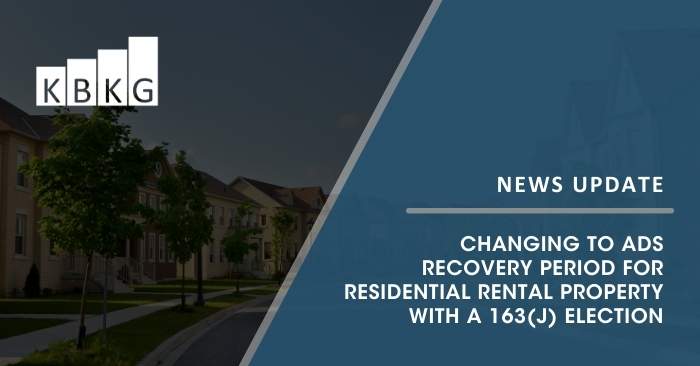Overview
Treasury and the IRS are contemplating additional procedural guidance that will assist taxpayers with compliance related to the ADS recovery period change for residential rental property. This is required under the Tax Cuts and Jobs Act (TCJA) when Real Property Trades or Businesses (RPTOBs) make the election under 163(j) to avoid interest expect limitations. In a letter issued to the IRS last month, the AICPA provided recommendations to comply with the new legislation.
AICPA Recommendations
The AICPA recommends allowing taxpayers to use Form 3115 for an automatic change of accounting method by updating the following:
- Provide an update to designated change numbers 87 and 88 under sections 6.04 and 6.05 of Rev. Proc. 2019-43, to allow taxpayers to file a change in use accounting method change for property when an accounting method has not yet been adopted because a change in use was made in the immediately preceding year, but an impermissible method was adopted.
- Provide an update to designated change numbers 87 and 88 under sections 6.04 and 6.05 of Rev. Proc. 2019-43, to waive the scope limitation under section 5.01(1)(f) of Rev. Proc. 2015-13 for a taxpayer’s four taxable years after a RPTOB election was made.
Analysis
The TCJA provided that RPTOBs could elect exception from the interest expense limitation under section 163(j). As an offset, section 168(g)(8) required those electing RPTOBs to depreciate nonresidential real property, residential rental property, and qualified improvement property (QIP) (collectively, “applicable real property”) under the ADS. Revenue Procedure 2019-08 provided that this conversion to ADS was required for all applicable real property held by the RPTOB and was accounted for as a change in use under Treas. Reg. § 1.168(i)-4(d). However, the revenue procedure also provided that the conversion to ADS should be based on the ADS rules applicable to the year the property was placed in service, not the year in which the property was converted to ADS. This required residential rental property placed in service prior to January 1, 2018 to convert to a 40-year ADS life rather than the 30-year ADS life established by the TCJA for residential rental property placed in service after December 31, 2017. In 2021, the CAA2021 retroactively provided that electing RPTOBs are required to use a 30-year ADS recovery period for residential rental property placed in service prior to January 1, 2018.
Providing an update to designated change numbers 87 and 88, under sections 6.04 and 6.05 of Rev. Proc. 2019-43 would provide an exception that functions similarly to the “1-year depreciable property” exception provided under section 6.01(1)(b) of Rev. Proc. 2019-43. However, rather than applying to property placed in service in the prior year, it would relate to property subject to a change in use in the prior year. This exception would provide taxpayers with an opportunity to file an accounting method change when the RPTOB election was made in the year immediately prior to the year of change. Without this guidance, any RPTOB with residential rental property that made an election for its 2019 tax year would not be permitted to comply with the 30-year life requirement added by CAA2021 through an automatic consent Form 3115, Application for Change in Accounting Method. Rather, the RPTOB would have to file an amended 2019 tax return, which is administratively burdensome, particularly for partnerships subject to the partnership audit rules under section 6221 that require filing administrative adjustment requests under section 6227.
In addition, providing an update to designated change numbers 87 and 88 under sections 6.04 and 6.05 of Rev. Proc. 2019-43, to waive the eligibility requirement under section 5.01(1)(f) of Rev. Proc. 2015-13 that a taxpayer not have made or requested a change for the same item during any of the five taxable years ending with the year of change will allow taxpayers to adopt the change required by the CAA2021 on an automatic basis. Without this guidance, any electing RPTOB that made an accounting method change related to residential rental property within the five years preceding its implementation of the change required by the CAA2021 cannot adopt the CAA2021 requirements on an automatic basis. The situation is similar to the waiver of the eligibility rules provided in Rev. Proc. 2020-25, which allow taxpayers to file an automatic accounting method change to change their method of accounting for depreciation of QIP.
Click here to view the entire comment letter from the AICPA to the IRS.
Contact our cost segregation specialist for more information.


